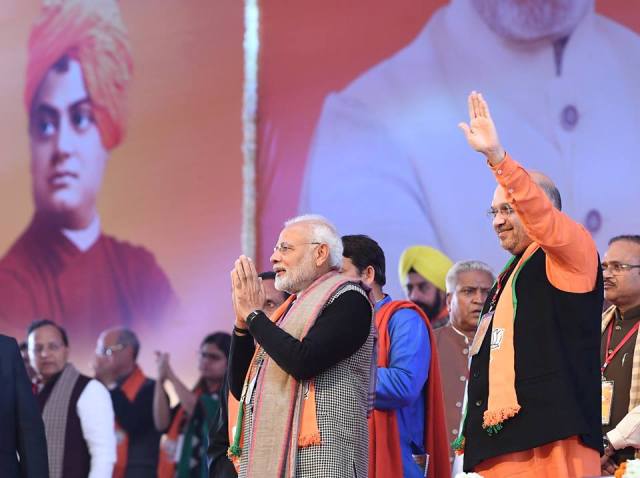 A landslide win for the ruling BJP could change Indian society and democracy for ever. [Photo: Prime Minister's Facebook page].
A landslide win for the ruling BJP could change Indian society and democracy for ever. [Photo: Prime Minister's Facebook page].
The 900-million strong Indian electorate has spoken – and the Bharatiya Janata Party led by Prime Minister Narendra Modi has been swept decisively back to power.
His party enters its second term with a far larger mandate than even his most ardent supporters expected – and with vote share increases even in states like West Bengal, Andra Pradesh, even Madhya Pradesh, they had no right to expect to do well in.
Now the BJP has won 303 seats out of 542 in the Lok Sabha (Lower House) and 40% of the vote share (up from 282 and 31%) – a national landslide.
No one in India has held so much unrivalled power, certainly not for almost 40 years, since the days of Indira Gandhi.
He now has five more years to force through change which privileges Hindus and challenges institutional autonomy. Many fear these may undermine the delicate secular political balance developed under Nehru and the Congress Party since independence in 1947.
What explains this coronation of India’s hard man? Certainly, the past five years of BJP-led government could never have expected such an endorsement. It failed to deliver on its promise of ‘happy days’, with a mixed economic record, unemployment up, rural poverty devastating, and increasing attacks on liberal institutions and non-Hindu minorities.
First, the BJP had far more money to ensure Modi’s image appeared all over India. Secondly, the BJP had far better political organization, and far more eager party cadres spreading the message.
Thirdly, Modi was able to appeal to all voters from all sections with a strong nationalist message. A terrorist strike in Balakot in February, just as campaigning started, when an army truck was blown up, allowed him to ramp up his rhetoric about a growing crisis, forcing opposition leaders to flounder in his wake.
He blamed age-old rivals Pakistan for the attack, and appealed, emotionally, for voters to back their army ‘heroes’ and help him protect ‘the sacred motherland’. He also blamed Muslims as ‘the Others’, playing to the prejudices of all Hindu castes and his cheering cadres.
Above all, though, Modi confirmed he was the most able campaigner in Indian politics, criss-crossing the county, charismatic, playing up Hindu photo-opportunities, with ringing sound-bites.
Modi became the issue in a campaign which became more and more presidential as it unfolded over its seven phases and five weeks – leaving voters to see him as celebrity, icon, even God-like.
He disproved the old Indian axiom that incumbency is a burden. But, in truth, opponents and rivals could find no message to dent his authority. Now, the fragmented opposition parties are preparing for tough times.
‘Mr Modi is dangerous’ and ‘attacks institutions and institution-making’, charged his leading opponent, Rahul Gandhi, President of the Congress Party. But it failed to halt the Modi juggernaut, despite an improving campaign from Rahul. He even lost his ‘family’ seat – though returns form another constituency.
Congress will now need another major rethink. Some argue, finally, time is up for its ruling Gandhi-Nehru dynasty – though it is unclear where – and how – a successor to Rahul is to be found.
Modi, though, does remain a hugely divisive figure in Indian politics. A recent lead article in Time magazine dubbed him ‘divider-in-chief’, and Muslims and minorities are preparing to hunker down.
Others fear for India’s civil and liberal democratic tradition, so admired globally. Critics in the media such as NDTV face constant government attacks and red-tape, as have those in universities, publishing, think tanks, even corporations who rival BJP-supporting companies.
Democracy, though, inevitably takes many forms – linked to a country’s own cultural, historical and political context. The growing influence of money power, the criminal charges against elected MPs, and weakening autonomy of the Election Commission are not good signs.
We must wait to see how Modi’s second five-year premiership will affect the autonomy of institutions, the place of non-Hindu ‘Other’ minorities, the social fabric, the relations of the Centre to states, and the distribution of resources.
Will the Indian model of secularism – that has helped solidarity across diverse languages, caste, class, regions, cities and villages, and above all religions – now be under threat?
And as Modi joins a growing global club of so-called populist, Strong-Man leaders – alongside Xi, Bolsanero, Erdogan, Putin, Trump and others – can we expect a more nationalist India flexing its muscles in South Asia, in the UN, in the Commonwealth, in the G20, and among the BRICs?
There is much to ponder, as Modi returns to his South Block office in Delhi from a mountain glacier retreat where he ‘retired’ to ponder the impending results, meditating like a Hindu Yogi, swaddled in a red blanket against the cold. He knows he has unfettered power and no rivals. He tweeted: “India has won.”
Paul Flather is a member of the Round Table Editorial Board and currently a Fellow at Mansfield College, Oxford. Opinion pieces do not reflect the position of the Round Table Board.



